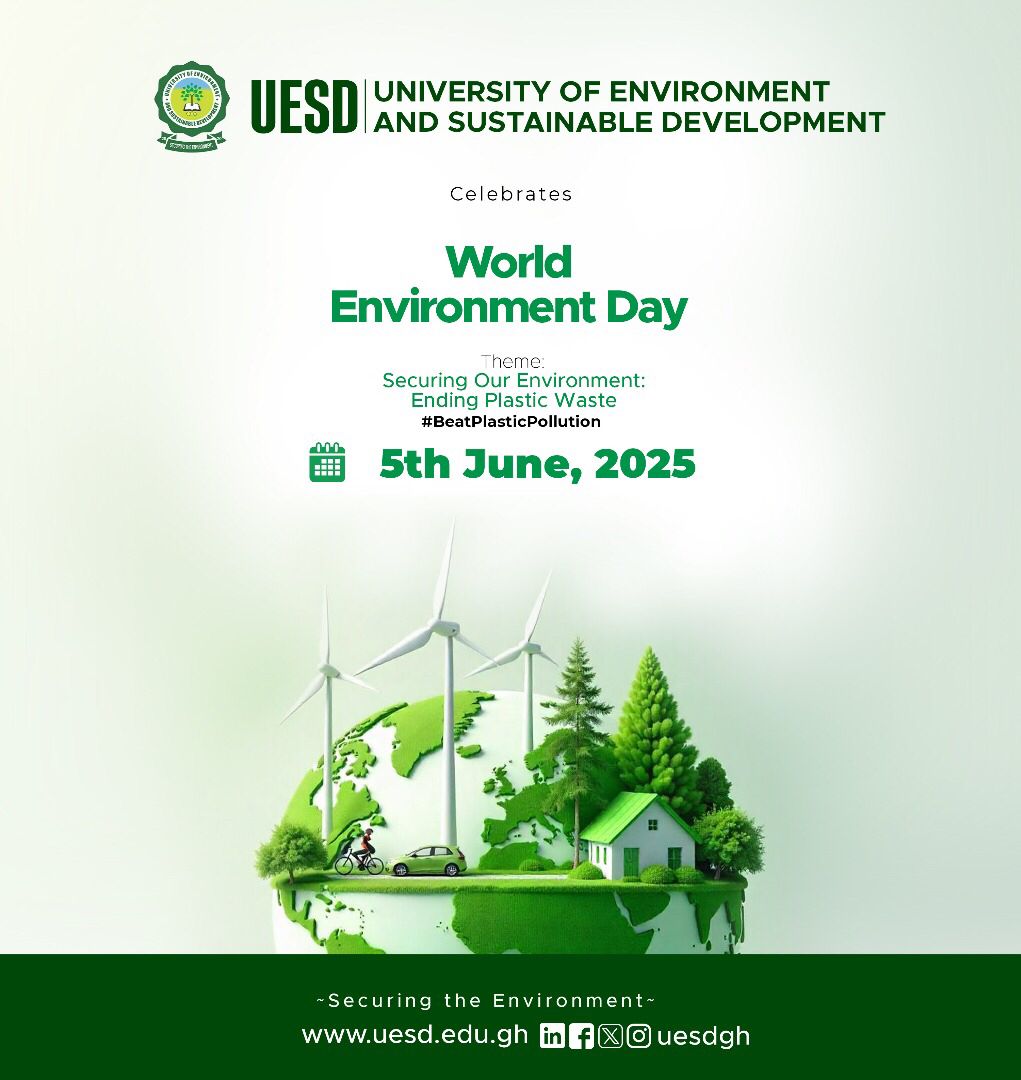By: Dr. CEnv. Rosemary Anderson Akolaa (Lecturer, UESD)
World Environment Day 2025 focuses on the global theme “Beat Plastic Pollution.” At the University of Environment and Sustainable Development (UESD), we have a special responsibility to lead by example and champion the movement toward a cleaner, safer, and more sustainable future environment for all.
Plastic has evolved into one of the most persistent and harmful pollutants of our time. From convenience packaging to everyday single-use items, plastic has permeated every aspect of our lives. However, what was intended for convenience has now turned into a global environmental crisis.
Every year, the world generates over 400 million tons of plastic, with approximately 40% being used only once before being discarded. Unfortunately, a large portion of this waste ends up in our rivers, oceans, and soil, where it can take hundreds of years to decompose.
It is important to note that plastic pollution is also a major contributor to climate change. Production, transportation, and disposal of plastic are all highly energy-intensive processes. Most plastics are made from fossil fuels like natural gas and petroleum, meaning that greenhouse gases such as carbon dioxide (CO₂) and methane (CH₄) are released throughout their lifecycle.
When plastics are incinerated or degrade in landfills and open environments, they emit greenhouse gases, further intensifying the greenhouse effectand contributing to global warming. This vicious cycle links plastic waste directly to climate instability, rising sea levels, and extreme weather events.
Plastic pollution poses a serious threat to biodiversity. Marine animals often mistake plastic particles for food, leading to injury, starvation, and death. Microplastics, thus, tiny fragments of degraded plastic, have now been found in the deepest parts of the ocean, the highest mountain peaks, and even in rainwater samples.
Terrestrial ecosystems are also affected. Plastic waste clogs drain and waterways, damages soil health, prevents plant root penetration, and reduces agricultural productivity. In Ghana, urban flooding is often worsened by plastic-blocked drainage systems.
Emerging research confirms that plastic pollution is an environmental threat and a public health concern. Microplastics have been detected in our food, drinking water, and human blood. These particles may carry toxic chemicals, disrupt hormonal systems, and contribute to long-term health problems, including cancer, infertility, and metabolic disorders. Again, informal recycling and open burning of plastic waste expose workers and nearby communities to dangerous fumes and pollutants, leading to respiratory illnesses and other health issues.
Call to Action (UESD)
Today, we are not just celebrating an event. We are making a collective commitmentto action. As a University committed to environmental sustainability, we can lead the way through:
- Reducing single-use plastic on campus
- Promoting reusables and eco-friendly alternatives
- Supporting innovations in biodegradable packaging
- Educating others on the hidden dangers of plastic pollution
Our simple daily choices, like carrying a reusable bottle, saying no to plastic straws, or organizing community clean-ups, can make a powerful difference.
In conclusion, beating plastic pollution is not just an environmental necessity, it is a moral obligationto protect our health, our communities, and future generations. Let this World Environment Day inspire us to turn awareness into action, and action into impact.
Together, we can beat plastic pollution, one habit, one innovation, and one decision at a time.

